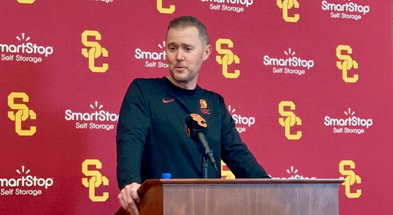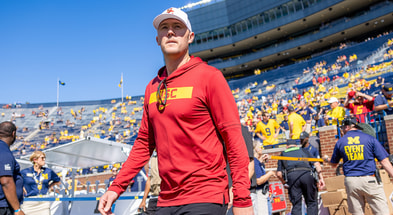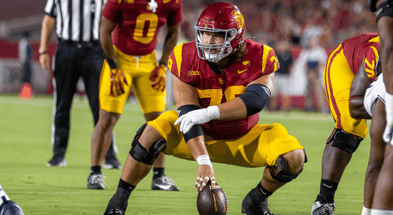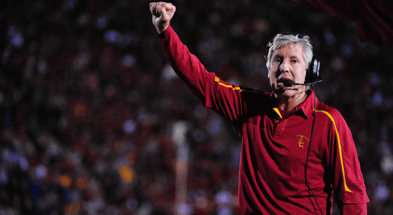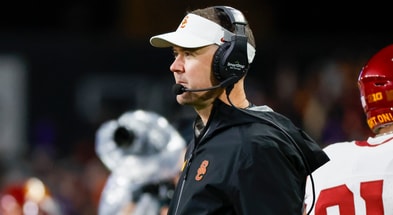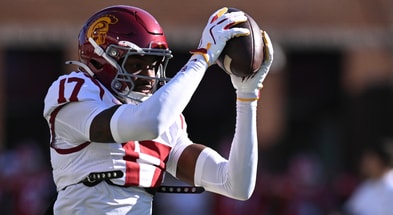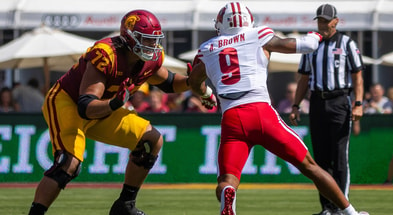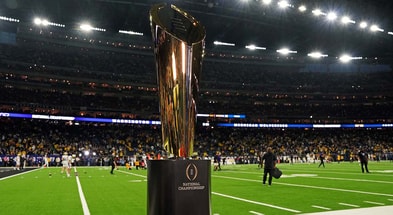Musings from Arledge: The state of college football

College football may be too great for its own good. The current trajectory of the game probably serves very few. But the current trajectory may be inevitable because of the game’s popularity.
Here’s the reality: major college football has outgrown its traditional role and function. It started as a side activity for actual college students, cheered by those (like Teddy Roosevelt) who believed it helped students grow into better men. No, this old way of looking at college football isn’t completely dead. It still exists at the lower levels. And to some extent its legacy lives on even at the major-college level: players are still expected to go to class, and many coaches still take seriously their role in developing character in the young men they coach.
But college football has been fighting a losing battle against this legacy for a very long time. And it’s not necessarily because the decision makers are greedy or stupid, although they are often both. The game has simply become too popular and gotten too big. How can you continue to treat college football as a side activity for college students—a supplemental learning experience—when it has become arguably the second-most-popular spectator sport in America? College extracurricular activities don’t generate billions of dollars. They don’t consistently score television ratings higher than the World Series. They don’t create an entire industry based off following 17-year-old prospects, adults poring over the kids’ mysterious utterances as if they came straight from the Oracle at Delphi.
Big-time college football isn’t a hobby. It isn’t a side show. It isn’t amateur. It is an enormous, wildly popular, billion-dollar industry. Just like a houseplant can outgrow its old pot or a crustacean can outgrow its old shell, college football has outgrown its old strictures. They don’t fit anymore. The demand is too great. The sport is too popular. In some ways, it’s too great.
Back when coaches made less than $100,000 a year and very few games were on television, the old rules made sense. The mythology surrounding amateurism made sense. But for years the foundations of college football have been crumbling under the weight of television revenues and ten-million-dollar coaching contracts. And recently the absurdity and unfairness of the old rules became so obvious that the old understanding of college football simply collapsed; players, fans, and ultimately federal judges just didn’t buy it anymore.
Change has come fast, and fairness required many of these changes. If young men are putting their bodies on the line in a dangerous game that generates more than a billion dollars a year, and if the schools, coaches, and broadcasters are all making many millions, it is absurd that the players wouldn’t share in the wealth. They have to.
But let’s not forget how this new world changes players’ lives.
Most of our focus when we discuss these things is how it impacts recruiting (and thus our team’s prospects) and how it makes a coach’s job much more difficult. Both are worthy of discussion.
But look at how this new world impacts the lives of high school recruits and college players. Yes, they are getting real money (at least some of them are). But most aren’t getting the kind of money that will set them up for life. They may think they are; but they’re not. Most are making decent compensation for three or four years.
But that money changes their status. These players are no longer amateurs, and they’re no longer deserving of a hands-off approach from the public and media. In the old days, I was sympathetic to the argument that you can criticize coaches publicly but should pull your punches when it comes to the “kids.” Not anymore. These “kids” are professionals. If you’re making hundreds of thousands or in some cases millions of dollars to play the game, and if all of us are constantly being asked to donate to you because that’s the only way you’ll play for our school, you’re a professional, and you will be scrutinized as a professional. I don’t know that this added pressure is good for everybody. But it’s there, and it’s not going away.
I am quite sure the current celebrity culture of high school recruiting isn’t good for anybody. It’s not good for sixteen and seventeen-year-olds to be treated like pop stars or Hollywood actors; they should not be getting appearance fees; they should not be in the spotlight; they should not be treated as if they are special. They’re not—at least not in any meaningful way. Most of these guys will never make a living from football. And even the ones who might aren’t truly special (again, in any way that matters) and don’t necessarily benefit from this treatment. High school kids are dumb. Yep, I said it. It’s not their fault. They have no life experience, and their pre-frontal cortexes are not close to being fully developed. Having adults fawn over young people because they hit the genetic lottery is not healthy and will only get in the way of what they most need: to learn and grow so they can become responsible, productive adults. They will live a very long time after college football. They need to get ready for it.
Look at what happens to most Hollywood childhood stars; they almost all turn out to be a mess. Living with accolades and money when you’re young almost inevitably leads to serious problems. It’s hard to avoid a sense of entitlement and it’s hard to keep your life, your opinions, and your own importance in perspective. These kids’ parents will have to work extra hard to help these guys grow up mentally and emotionally healthy, because the current is pushing strongly against them.
Top 10
- 1New
Marshall Faulk
Deion Sanders adds HOFer to staff
- 2
Greg Sankey
2024 salary revealed
- 3
Mike Woodson
Considering retirement amid IU struggles
- 4
Attorneys fire back
Brian Kelly comments draw ire
- 5
SEC pay day
Conference announces revenue
Get the On3 Top 10 to your inbox every morning
By clicking "Subscribe to Newsletter", I agree to On3's Privacy Notice, Terms, and use of my personal information described therein.
Coaches will also have to work extra hard to mold their characters. But it’s harder and harder to do that when NIL and transfer portal free agency takes away all of a coach’s leverage. Discipline a kid, and he may leave. Bench a kid because he’s lazy, and he may leave. Tell a kid that he should wait his turn and hope he’ll learn something about delayed gratification, and he’ll take his suitcase and go, because somebody else wants to give him a Mercedes right now.
The way recruiting works also cheapens a man’s word. I don’t get emotionally hung up on decommitments; they happen, we must expect them to happen, and everybody knows a verbal isn’t binding anyway. But let’s not forget that every decommitment is an example of a player breaking his word. You tell coaches that you’re going to play for them, and later you tell them you won’t. That’s not a crime, and it doesn’t mean the player has bad character. But a system that rewards people coming in with a bag of cash to convince somebody to break their word isn’t great.
Likewise, every transfer for a better financial deal is an example of a player turning his back on his teammates. Again, transferring can be justified. Lots of people do it and for good reasons; I did. But telling a young man that he should leave his teammates so he can make more money does fly in the face of loyalty and other values that we try to teach young men. Life is full of temptations; our wants, needs, and desires often compete with our moral code no matter who we are. The changes to college football just make that conflict more prominent for a lot of young men.
But life lessons are becoming harder to teach, I suspect. When an 18-year-old kid makes more money than mom and dad, has been treated as special since he was in elementary school, and constantly has self-interested hangers-on in his ear trying to steer him directions that only help those third parties, it’s going to be difficult for parents, coaches, professors, and pastors to help these guys grow up. Eighteen-year-olds with sports cars and fancy high-rise apartments are going to think they are already grown up. It’s going to be very difficult to help these guys understand that they’re just playing a game, and that even if you’re really fast and have good hands, that doesn’t mean you’re a special human being. Being a special person—being a good family man, a good friend, a good teammate, a benefit to your community, being kind and thoughtful and productive—is a whole lot more important than being able to catch a stupid football. And this is coming from somebody who cares a lot about people catching stupid footballs.
I’m concerned that the changes to college football are bad for the players, even though I believe players should be sharing in the huge revenues the game brings in, and even though I think players should have the freedom to change their locations and circumstances like coaches and athletic directors do. Yet I see no way out of this cul-de-sac. The game is popular, and as long as it is, the money will come in, and the attention will be unhealthy. That’s just the way it is. And while these players could have a college experience more like mine if they chose to forego the bright lights and play at a level where amateurism and academics are still valued, that’s not fair either. Because why should an immensely talented competitor have to play against guys like me where they will never be truly challenged?
I love college football. I love its history, its passion, its rivalries, its diversity, and often its strangeness. It’s a great game. I’ll continue to watch, as will almost all of you. And as long as we do, college football can never be what it once was. It will instead be a billion-dollar industry with all of the trappings and downsides that come with that.
Teddy Roosevelt would hate it.
The good news, and I want to leave you with good news, is that the game isn’t completely corrupted yet. There are still plenty of good kids with good parents coached by good men, and when you meet them, you are thrilled to see that young men like this can exist under these circumstances. There are the Jake Olsons and the Travis Dyes; there are kids like Zachariah Branch, who was the bluest of blue chips and the center of attention at a very young age, yet he still seems to have perspective and a fantastic work ethic. You have guys like Matt Leinart, who was treated like a pop star 20 years ago and had security surrounding his every ballroom dance step. But based on his social media seems to be a well-adjusted, humble dad and husband, who understands not to take himself all that seriously. There are many, many others; I can’t list them all, and that’s really the point I’m trying to make. In many respects, things are getting worse, but there’s still light in this tunnel.
So, yes, I’m deeply concerned about where the game is headed. I’m concerned about how the changes will affect the kids that grew up loving the same game I loved but just happened to be so big or fast that they found themselves sucked into a harsh spotlight that can easily distort their world views and development. But it’s not all bad yet. And I hope parents, coaches, pastors, and other figures of influence can help steer these guys through what are, I fear, very dangerous waters.

